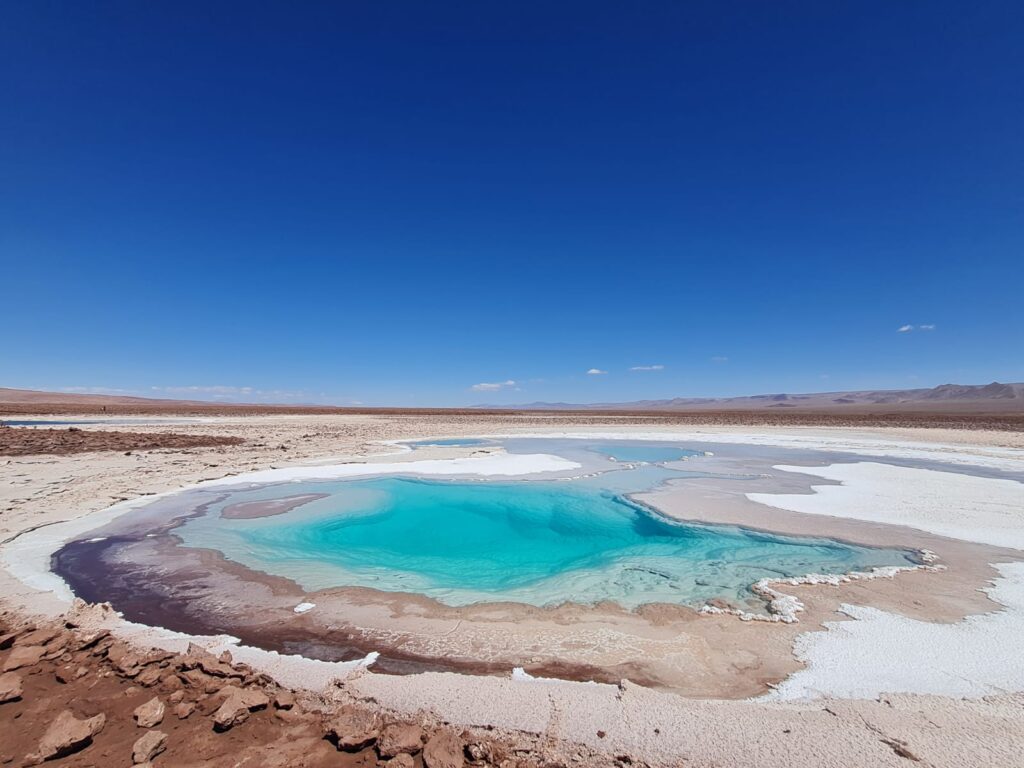The Latin American Lithium Industry is at a Crossroads
Policies set now by Argentina, Bolivia and Chile could determine the course of lithium mining—and the fight against climate change.
It may be one of the most overused clichés favored by headline writers, but nonetheless, it is true that the Latin American lithium industry is at a crossroads. The regulatory decisions made by the Governments of Argentina, Bolivia, and Chile in the following months and years will set the course for the lithium industry, with significant consequences for the planet’s future.
Lithium generalities
Lithium has various uses, from antidepressant medication to glass, lubricants, rocket propellants, and many others. However, the lightest of metals is at the center of climate talks because it is one of the main components of lithium-ion batteries. The world will need large amounts of lithium to reduce fossil fuel emissions drastically. Some estimates indicate that the demand for lithium carbonate (the form of lithium used for batteries) will increase from 600.000 tons in 2022 to 2.4 million tons by 2030.
Thousands of pages could be written on the ecological and environmental justice challenges of lithium mining, but we will leave that for another blog post.
For now, it is useful to know that there are two main ways of obtaining lithium: hard rock mining and brine. Hard rock mining involves digging, crushing, and combining rocks with chemicals to get lithium. This energy-intensive process produces CO2, uses large quantities of water, and has the typical undesirable side effects of traditional mining.
On the other side, brine lithium production consists of draining underground brine from salt plains, evaporating the water from the brine through direct sun exposure, and then adding chemicals to produce lithium carbonate. This process is more profitable, less intensive, and produces less CO2.
For these reasons, mining lithium from brine has become the preferred method for lithium production. Although it is believed to be less harmful than hard rock mining, extracting lithium from brine still poses serious social and environmental concerns, such as the destruction of salt flat ecosystems and excessive use of water resources. These issues often result in conflicts with local and indigenous communities, as brine deposits are typically found in water-scarce desert regions.
The “Lithium Triangle” and its Challenges
Even though lithium is one of the most abundant metals on earth, lithium-rich brine deposits only occur in a few places. The vast majority of the world’s lithium reserves lie in what is known as the “lithium triangle”, a high-altitude region with plenty of salt flats in the Andes Mountains shared by Argentina, Bolivia, and Chile. This is an ideal place for producing lithium from brine since the weather is dry and sunny, providing ideal conditions for the natural evaporation process.

Consequently, to some degree, the fate of the fight against climate change will depend on the policies adopted by these three Latin American countries in the near future. However, the highly concentrated possession of such a precious resource could simultaneously be a blessing and a curse, particularly due to the pressure from international markets. The main challenge for these countries is to respond to the lithium demand while preventing significant environmental impacts and securing sufficient and equitable economic growth at the national level.
Argentina, Bolivia, and Chile are all in complex political, social, and economic situations. In order to capitalize on the current demand for lithium, it is imperative for those nations to take proactive measures and adopt effective strategies to become leaders in the transition to a more sustainable global paradigm of natural resource management and exploitation.
Bolivia has the largest lithium reserves in the world; however, it does not produce lithium carbonate at an industrial level. In 2008, Bolivia nationalized lithium, and since then, the state has controlled the access, extraction process, and production of lithium carbonate. The nationalization process has created a massive challenge for the Bolivian government in developing the infrastructure and the highly complex technical capacities required for lithium production. This challenge has not been successfully addressed yet. However, the country is now trying to create partnerships with foreign companies that can provide the required technology and technical capacities to get the business started.
On the other hand, Argentina is taking this opportunity seriously with an open, foreign-friendly, and low-royalty approach. Currently, there are more than 40 lithium mining projects in development in Argentina, threatening Chile’s seat as the world’s second-largest lithium producer (Australia is currently the undisputed champion, though it has fewer reserves than Chile). However, extreme inflation numbers, among other political problems in Argentina, still make it a highly risky place for western companies to make serious investments. Despite its problems, Chinese companies are betting hard on Argentina, mainly because securing lithium supply is more of a strategic decision rather than a profitable business.
The Chilean case
Meanwhile, Chile is facing its own challenges, which are mainly related to the peculiar laws and regulations governing lithium production there. In 1976, dictator Augusto Pinochet declared lithium as a material of “nuclear interest” since, at that time, lithium was thought to have relevant nuclear uses, which, given its wide availability, turned out not to be so relevant.
In Chile, mining companies must obtain a mining concession to explore and exploit mineral deposits, granting them exclusive exploration and exploitation rights over the minerals in a specific area. Companies must meet certain requirements and pay a fee to obtain a concession, as well as fulfill certain obligations, including exploration and royalty payments, to maintain the validity of the concession. In 1979, lithium was declared a mineral of national interest and removed from the general concession system that applies to all other minerals in Chile, with the exception of the concessions granted before 1979, which were mainly in the hands of public corporations.
For these reasons, lithium mining in Chile is mainly restricted to the old concessions for which the State has signed leasing agreements with SQM and Albemarle, the world’s two largest lithium mining companies.
The leasing agreement with SQM, a Chilean company owned in part by the Chinese giant Tianqi, began in 1986 and will end in 2030. On the other side, Albemarle, an American company based in North Carolina, has a leasing agreement with Chile over lithium concessions signed in 1987 that will expire in 2043.
Although not exempt from controversy, SQM and Albemarle have been incredibly successful, making Chile the largest producer of lithium carbonate until 2017, when Australia surpassed it. In fact, those companies have been so successful that in 2022, according to the Autonomous Fiscal Council of Chile—an autonomous public organization that advises the Government on fiscal responsibility—the fiscal revenues from lithium production were around five billion dollars.
The money brought by SQM and Albemarle is more than the state’s combined revenues from all copper mining operations in Chile, which have been historically referred to as the “salary of Chile”. This fact is especially relevant because the largest copper mining company in the world, CODELCO, is wholly owned by the State of Chile.
The big question is: what will happen with the Chilean lithium industry when the leasing agreements come to an end? Will SQM or Albemarle be able to deal with the uncertainty of not knowing if the business will continue after having invested—and earned—billions of dollars in infrastructure, equipment, human capital, and operations?
Lithium mining companies’ concerns are justified. During its 2021 election campaign, Chilean President Gabriel Boric promised the creation of a national lithium company that would “develop a new national industry on this strategic resource, giving a central role to communities and adding value to the lithium production”.
Some voices within the ruling coalition, mainly from the Communist Party, have called for the total nationalization of the lithium industry. However, the government has indicated that it will involve private companies in its National Lithium Strategy while also establishing a national lithium company.
While the nationalization of natural resources has been a long-standing goal of the traditional Latin American left, the remarkably positive results of SQM and Albemarle are hard to ignore, especially when considering the relatively pale numbers of state-owned CODELCO and Bolivia’s struggles to build its own lithium industry.
In addition, the Chilean Constitution states that public companies need to be created by law, which means that the idea of a public lithium company will have to be approved by the Chilean Congress, where President Boric’s coalition does not have the majority. Therefore, even if the current Chilean Government wanted to take over lithium production, that won’t happen soon.
It is unlikely that the Chilean Lithium Strategy will put a gravestone on SQM and Albemarle operations since the Chilean government knows that it does not have the capacity, and know-how, necessary to thrive in this business. It also doesn’t want to miss the chance to take advantage of the lithium boom while it lasts.
However, having certainty about the rules of the game is key for companies to invest in better methods and more environmentally sound technology. Unless the regulatory framework is sufficiently stable, companies will likely avoid significant investments to prevent or diminish the negative impacts of their business.
The world’s thirst for lithium will not recede soon, and the mineral will be extracted regardless. It is up to the governments of Chile, Argentina, and Bolivia to make the right choices that allow the development of safe, responsible, and equitable lithium production, for the sake of their people and the world.
Few cases can show more clearly how relevant political approaches, laws, and regulations are for the future of the people and the planet. The eyes of the world are closely following what the countries conforming to the “lithium triangle” will do. I will keep you posted.







Reader Comments